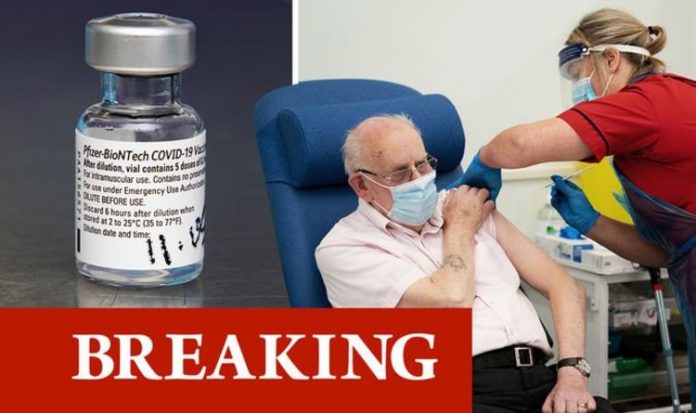The warning comes after two members of NHS staff who had the COVID-19 jab on Tuesday – the first day of the mass vaccination programme – had allergic reactions. Both are said to be “recovering well” and the NHS in England has informed all trusts involved with the vaccination rollout. The news prompted the Medicines and Healthcare products Regulatory Agency (MHRA) to issue precautionary advice to NHS trusts that anyone who has a history of “significant” allergic reactions to medicines, food or vaccines should not receive the vaccine.
Professor Stephen Powis, national medical director for the NHS in England, said: “As is common with new vaccines the MHRA have advised on a precautionary basis that people with a significant history of allergic reactions do not receive this vaccination after two people with a history of significant allergic reactions responded adversely yesterday.
“Both are recovering well.”
The MHRA advice states: “Any person with a history of a significant allergic reaction to a vaccine, medicine or food (such as previous history of anaphylactoid reaction or those who have been advised to carry an adrenaline autoinjector) should not receive the Pfizer/BioNtech vaccine.
“Resuscitation facilities should be available at all times for all vaccinations. Vaccination should only be carried out in facilities where resuscitation measures are available.”
It is understood that both the staff members had a significant history of allergic reactions – to the extent where they need to carry an adrenaline auto injector with them.
They developed symptoms of “anaphylactoid reaction” shortly after receiving the vaccine and both have recovered after the appropriate treatment.
READ MORE: Grandad Martin Kenyon brilliant hilarious quip at Piers Morgan
Among the health staff, care home workers and elderly who got the jab was Ms Keenan who said she felt “so privileged” to be the first person in the world given the Pfizer vaccine.
Amid the jubilance, Mr Hancock cautioned that the guidance still needs to be followed, as the vaccine is rolled out over the coming months.
He told MPs in the Commons that people must “temper our joy and enthusiasm” at the beginning of the rollout “with the need to keep each other safe”.
Mr Hancock added: “Let’s not blow it since we can see the answer is on the horizon.”
The MHRA approved the Pfizer vaccine and is currently considering the Oxford/AstraZeneca and Moderna jabs.
Oxford researchers have said more detail is required on how effective their vaccine – of which the UK has secured 100 million doses – is in older adults, the group at most risk of severe COVID-19.
This morning Professor Chris Whitty warned some people may need to be vaccinated again should the impact of the jab wane with time or the coronavirus mutate again.
He said it remains unclear how long the effects of the coronavirus vaccine will last and whether people will need to be re-vaccinated on an annual basis to ensure they are protected.
The Chief Medical Officer for England insisted more data on the vaccine will be needed to reach a conclusion on the need for repeated vaccinations but noted two scenarios may require the vaccination scheme to expand to include renew the vaccine.
Speaking in front of the Science and Technology Committee and Health and Social Care Committee, Prof Whitty said: “We don’t know how long…we know this is a very good vaccine to provide short to medium-term protection.
“We don’t know how long it lasts. It might last for a very long time, it might last for nine months.”







